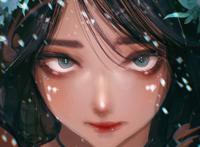星之彩(下)(15)
The rural tales are queer. They might be even queerer if city men and college chemists could be interested enough to analyse the water from that disused well, or the grey dust that no wind seems ever to disperse. Botanists, too, ought to study the stunted flora on the borders of that spot, for they might shed light on the country notion that the blight is spreading—little by little, perhaps an inch a year. People say the colour of the neighbouring herbage is not quite right in the spring, and that wild things leave queer prints in the light winter snow. Snow never seems quite so heavy on the blasted heath as it is elsewhere. Horses—the few that are left in this motor age—grow skittish in the silent valley; and hunters cannot depend on their dogs too near the splotch of greyish dust.
They say the mental influences are very bad, too. Numbers went queer in the years after Nahum’s taking, and always they lacked the power to get away. Then the stronger-minded folk all left the region, and only the foreigners tried to live in the crumbling old homesteads. They could not stay, though; and one sometimes wonders what insight beyond ours their wild, weird stores of whispered magic have given them. Their dreams at night, they protest, are very horrible in that grotesque country; and surely the very look of the dark realm is enough to stir a morbid fancy. No traveller has ever escaped a sense of strangeness in those deep ravines, and artists shiver as they paint thick woods whose mystery is as much of the spirit as of the eye. I myself am curious about the sensation I derived from my one lone walk before Ammi told me his tale. When twilight came I had vaguely wished some clouds would gather, for an odd timidity about the deep skyey voids above had crept into my soul.
They say the mental influences are very bad, too. Numbers went queer in the years after Nahum’s taking, and always they lacked the power to get away. Then the stronger-minded folk all left the region, and only the foreigners tried to live in the crumbling old homesteads. They could not stay, though; and one sometimes wonders what insight beyond ours their wild, weird stores of whispered magic have given them. Their dreams at night, they protest, are very horrible in that grotesque country; and surely the very look of the dark realm is enough to stir a morbid fancy. No traveller has ever escaped a sense of strangeness in those deep ravines, and artists shiver as they paint thick woods whose mystery is as much of the spirit as of the eye. I myself am curious about the sensation I derived from my one lone walk before Ammi told me his tale. When twilight came I had vaguely wished some clouds would gather, for an odd timidity about the deep skyey voids above had crept into my soul.
 白金之星x法皇
白金之星x法皇






















